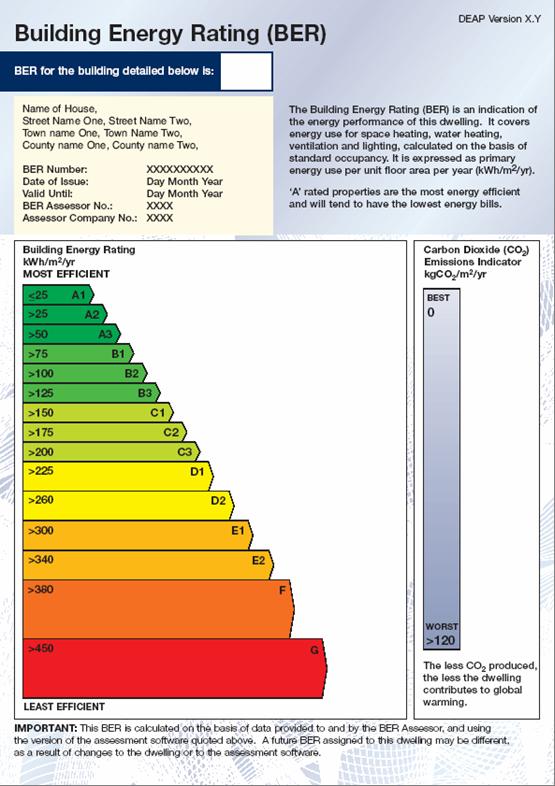A BER is an indication of the energy performance of a home.
It covers energy use for space heating, water heating, ventilation and lighting calculated on the basis of standard occupancy.
A BER is similar to the energy label for a household electrical appliance like your fridge. The label has a scale of A-G. A-rated homes are the most energy efficient and will tend to have the lowest energy bills.
From the 1st of January 2009, a BER certificate became compulsory for all homes being sold or offered for rent. If you are buying or renting a house or apartment, you are entitled to a BER so ask the seller, landlord or agent for it.
A BER certificate is accompanied by an advisory report which will identify how you might improve the energy performance of your home.
A BER is also required, subject to transitional arrangements, where construction of a new home begins on or after 1st January 2007.
There are exemptions for certain categories of homes, for example, protected structures and certain temporary homes.
A new home (i.e that has never been sold or occupied) is exempt from the BER requirement if the planning application was submitted on or before the 31st December 2006 and if it was substantially completed by 30th June 2008. ‘Substantially completed’ means that the external walls have been erected.

Full details of the requirements for BER’S can be found in S.I. 666 of 2006 .
To see what a Building Energy Rating Certificate looks like please click here .
To see an example of an advisory report, please click here .
BER assessments are carried out by registered BER Assessors who have been trained under the National Framework of Qualifications and have registered with SEAI.
Who needs a BER?
Last update Q1 2010.
A seller must provide a BER to prospective buyers or tenants when a home is constructed, sold or rented under the following circumstances:
New homes where planning permission was applied for on or after the 1st of January 2007. A new dwelling (i.e. a dwelling that has never been sold or occupied) is exempt from the BER requirement if it had been the subject of a planning application submitted on or before 31 December 2006 and if it was substantially completed by 30 June 2008. “Substantially completed” means that the external walls have been erected.
All existing homes for sale or rent on or after the 1st of January 2009. An existing dwelling is a dwelling which has previously been sold and/or occupied.
All new homes (even when not for sale) must have a BER certificate (barring those defined as being exempt above) before they are occupied as detailed under S.I. 666 under http://www.environ.ie/en/Legislation/DevelopmentandHousing/BuildingStandards/
BER assessments performed on new dwellings will also help determine compliance to Part L of the Building Regulations.
There are exemptions for certain categories of buildings (Ref. S.I. No.666 of 2006). For a more detailed list click here.
How Long will a BER Remain Valid?
A BER for a building will be valid for 10 years from the date of it being issued, unless there is a material change in the building which could affect its energy performance – for example an extension to the building, a significant change to the building fabric or a change in the heating system or fuel used.
Therefore if a property which has received a BER is placed on the market within 10 years of that BER being issued, and the property has experienced no relevant alteration in the meantime, then that same BER may be used by the building owner for the purposes of meeting their obligations under the Regulations.




